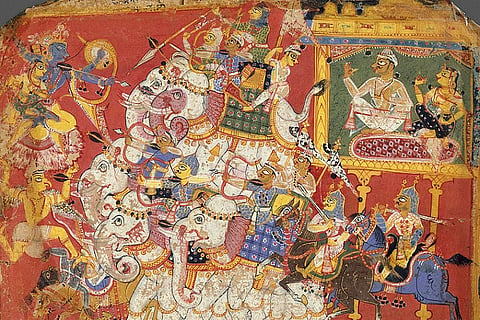

By Lakshmy
It’s not killing, it is order.
Yesterday, a friend casually asked why many Hindu festivals are about killing someone. This is not the first time I have heard this and this won't be the last time either, because understanding how dharma works is not easy. Dharma, being an indigenous construct, doesn't have a literal translation in English. It roughly translates to ethics, righteousness, duty and most importantly - order, because order is the morality of the universe.
The Vedas depicts two battles - one between Indra and Vrtra, and the other between Sudasu of Tritsu clan and the Purus. It is only in the later texts that more depictions of battles started coming in, the most famous of them being the Rama-Ravana yudha in Ramayana and the dharmayudha in Mahabharata. Then there is Siva as Mahakala, Yama as Dharma and Shakti as fiery Durga. In many forms and manifestations, death and annihilation are a part of Sanathana dharma because they are a part of life, and keep the cycle of life in motion.
A myth is a way of explaining the world. But a myth is both a sign and a symbol, hence polysemic and universal. That way, the stories of devas fighting asuras and evil forces tell us that a world, in which there is annihilation of adharma and disorder of uncontainable proportions, it becomes imperative to restore order, to bring peace for the larger good.
On a different denomination of meaning, it talks about the duality of human nature and the need to tame the self, to annihilate the ego and irrational aspirations to tread in the path of self-realization. It both conveys the same thing, excess of anything will bring chaos and it will have to be fought to change the status quo.
In Hinduism, the battle is the final step in containment, after every other method fail. So, it is not about the intent of violence, but the necessity to not do away with it which becomes the central conflict. There is no idea of conquest, superiority or ambition involved in this as the victor and perpetuator are the two sides of the same coin, only separated by the moral standing of their choices. The victor is never highly rewarded and the victim is never forgotten unlike in human history, hence it’s not about power, resistance, domination or subjugation. Again, it is simply about bringing or restoring order.
Dharma is of paramount importance in this, so much so that even when there is a battle it is only between the chosen candidates for the task, and except in Dharmayudha the battles are fought righteously.
The rise of adharma was so high in Mahabharata that unethical means had to be opted. But such choices only indicate the need to do the unpleasant sometimes for the larger right. Any reading of the narrative will tell us that those who used adharma got engulfed in it, even the winners were not spared of the consequences. The mythical battles are never once targeted at innocent ones, kin and kith just to prove a point. It is always direct, and hence it is not chaotic mindless violence or enjoyment of butchery.
A world without ethics and righteous order will become unlivable sooner or later. So live ethically, keep our ego in check and tread the path of knowledge, that is all Dharma is. When there is order, there is everything.
Note: The views expressed here are the personal opinions of the author.